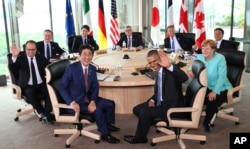Leaders of the Group of Seven wealthiest economies called global growth their "urgent priority" and expressed concern about North Korea, Russia and maritime disputes as their summit in Japan came to a close Friday.
A final statement of the meeting addressed broad issues facing the global economy while glossing over a difference of opinions among G-7 leaders over fiscal stimulus.
"Weak demand and unaddressed structural problems are the key factors weighing on actual and potential growth," the 32-page declaration said. "We remain committed to ensuring that growth is inclusive and job-rich, benefiting all segments of our societies."
Countries agreed against "competitive devaluation" of their currencies, compromising to achieve "a more forceful and balanced policy mix" to "achieve a strong, sustainable and balanced growth pattern," taking into account the individual needs of each country.
While U.S. President Barack Obama spoke optimistically of sustaining "the momentum of the recovery that's taking place in the United States," Japanese Prime Minister Shinzo Abe presented a grimmer view of the global economy, comparing current economic conditions with those of 2008 when the collapse of U.S. investment bank Lehman Brothers triggered a global economic recession.
Many observers believe Abe was making those comparisons to give him cover for delaying a planned increase in Japan's consumption tax - a move unsupported by leaders such as Germany's Angela Merkel, who is wary of public spending to boost growth.
G-7 leaders also called on North Korea to comply with U.N. regulations and cease all testing of nuclear weapons, missile launches and other "provocative actions."
The group condemned Russia's annexation of the Crimean peninsula from Ukraine, deeming it illegal. The G-7 leaders warned of "further restrictive measures" to raise the cost on Moscow, but added that sanctions could be lifted should Russia meet certain criteria, such as fully respecting Ukraine's sovereignty.
Without explicitly mentioning China, the final declaration promised its aid in settling heated territorial disputes in the South China Sea, where China has aggressively built up islands despite claims of neighboring countries.
Leaders of Britain, Canada, France, Germany, Italy, Japan and the United States convened over two days in central Japan for the annual G-7 summit.






